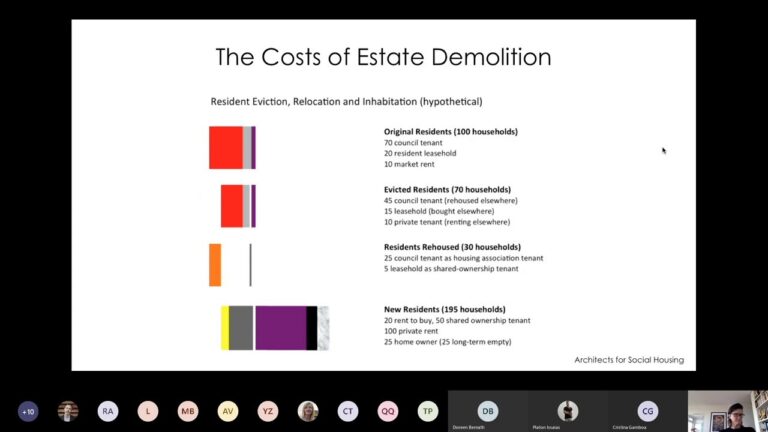
The urban conditions that we have been witnessing and responding to in London over the past 5 years are a direct result of the global phenomenon of the privatisation, marketisation and financialisation of housing, the neo-liberalisation of our processes of development, and the consequent decimation and destruction of our urban communities, environments and cultures in favour of short-term financial gain and increasing inequality. Simultaneously, the issue of sustainable cities, or more accurately ‘how we can develop sustainability’, is one of the most urgent issues of our time, and one in which architects and fellow built-environment professionals have both the opportunity and the duty to take a leading role. To be genuinely sustainable, just and equitable development must go far beyond the simplistic notions of the environment characterising so-called ‘green’ architecture. Architectural approaches must not only improve the physical, built and ‘natural’ environments in which we live, but also be socially beneficial and financially viable if we are to call them truly sustainable. Very few architectural treatises on the environment talk about the relationship of the environment to the economy, to the social dimension of the environment, or its relationship to the political sphere. The work of ASH pushes all these constituent contexts to the forefront of the architectural debate.
Geraldine Dening is the co-founder and Director of Architects for Social Housing (ASH), and a qualified architect with her own practice based in London. She is also a senior lecturer at the Leicester School of Architecture, where she lectures on professional practice and ethics, as well as running a design studio. In 2018 Geraldine was named by the Evening Standard newspaper as one of London’s 30 most influential architects. and with ASH co-founder Simon Elmer she is working on a book titled ‘For a Socialist Architecture’. Recent projects with Architects for Social Housing include designs and feasibility studies for additional housing and improvements to 6 council and social housing estates in London threatened with demolition. These include proposals to increase the housing capacity on Central Hill Estate in South London by up to 50% with no demolition, and on West Kensington and Gibbs Green Estate, as part of the community’s application for the Right to Transfer the estate into community ownership. She also devised and co-ordinated Open Garden Estates, a series of events hosted by estates threatened with demolition. As ASH’s lead architect she is also currently working with a number of housing co-operatives to explore new forms of community-led development.
source